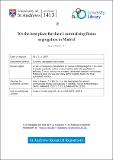‘It's the best place for them’ : normalising Roma segregation in Madrid
Abstract
I contribute to the debate about the persistence of Roma marginalisation in contemporary Europe by analysing the conflict that took place in 2008 in Madrid over the segregation of Gitano (Spanish Roma) children in state schools. Tracing the changing place of Gitanos in the city since the early 1980s, I demonstrate how current practices of educational segregation build on long-term processes of Gitano control and isolation in housing policy and its implementation. I reconstruct the layering of complementary actions and discourses of exclusion which together make the isolation of Gitano children appear commonsensical and necessary.
Citation
Gay y Blasco , P 2016 , ' ‘It's the best place for them’ : normalising Roma segregation in Madrid ' , Social Anthropology , vol. 24 , no. 4 , pp. 446-461 . https://doi.org/10.1111/1469-8676.12333
Publication
Social Anthropology
Status
Peer reviewed
ISSN
0964-0282Type
Journal article
Collections
Items in the St Andrews Research Repository are protected by copyright, with all rights reserved, unless otherwise indicated.

